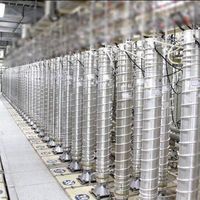Khamenei Says Hamas Attack Also Targeted US Regional Influence
Praising the October 7 Hamas attack on Israel, Supreme Leader Ali Khamenei said on Wednesday that Iran’s policy is not “to throw Zionists and Jews into the sea.”
Speaking at a gathering in Tehran, Iran’s 84-year-old ruler said the “Al-Aqsa Storm” was against “the Zionist regime,” but its real aim was to expunge American influence in the region.
“This historic event, in the true sense of the word, was able to disrupt America's policies in this region, and God willing, this storm will continue and will erase America’s agenda."
Khamenei reiterated Tehran’s long-held policy of demanding a referendum to decide the fate of Palestine and Israel, but at the same time called for the “Al-Aqsa Strom” to be repeated, which was in essence an attack on civilians and widespread and indiscriminate killings.
"The Islamic Republic of Iran is in favor of a referendum in Palestine and respects the opinion of the people. The viewpoint of the Islamic Republic is not to annihilate the Zionists and Jews,” Khamenei said.
Khamenei and his supporters have rejected calls for a referendum in Iran to change the constitution after several rounds of popular anti-regime protests.
During his 34-year rule, Khamenei has made Israel’s destruction the top foreign policy priority of the Islamic Republic, directing vast economic resources to creating, funding and arming militant groups in the region whose aim is to fight the Jewish state. Palestinian armed groups as well as the Lebanese Hezbollah have been sustained by Tehran’s full support.
In his speech, Khamenei harshly condemned the Israeli attacks in Gaza, without mentioning that the campaign began after Hamas killed 1,200 people in Israel, mostly civilians. He insisted that Israel’s military operation has been a disgrace for the United States and other Western countries that have supported it, claiming that 5,000 children have been killed by phosphorus bombs.
After a strong international reaction to the Hamas attack, the Iranian regime tried to argue that it had no foreknowledge of the operation. However, many find it hard to believe that Hamas would engage in such a risky adventure without first clearing it with its most important patron. Claiming no role in the October 7 terror attack, the Islamic Republic has avoided direct military involvement in the ensuing war, despite boasting for years of having a destructive ballistic missile arsenal directed against Israel.
In the same vein, the Lebanese Hezbollah has also avoided a full war with Israel, limiting its activities to border skirmishes.
Khamenei also dismissed US efforts to forge a new Middle east, saying that their plans in Lebanon and the occupation of Iraq have all failed. They were also unable to shape Syria according to their liking, he said, accusing Washington of engineering the revolt against the government of Bashar al-Assad.
"The political geography of the region is undergoing changes, but not in favor of the United States; rather, in favor of the Resistance Front. Yes, the geopolitical map of West Asia has changed, but in favor of the resistance, and the resistance has emerged victorious,” Khamenei said referring to all the proxy forces the Islamic Republic has created and nurtured in the region.
The Hamas attack and the ensuing Gaza war have for now halted the normalization process between Israel and Saudi Arabia, which Iranian officials have highlighted in recent weeks.
Khamenei went on to emphasize that the current trend in the region is to eradicate US influence and power, calling it “American hegemony.”
"Today, politics and orientation in this region are about getting rid of America. One of the clear and prominent signs that is evident today is the Al-Aqsa Storm. Yes, this storm is against the Zionist regime, but it is about getting rid of America," Khamenei declared.







